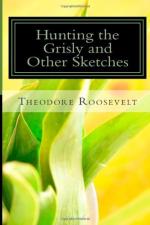Though it was always more difficult to kill the bison of the forests and the mountains than the bison of the prairie, yet now that the species is, in its wild state, hovering on the brink of extinction, the difficulty is immeasurably increased. A merciless and terrible process of natural selection, in which the agents were rifle-bearing hunters, has left as the last survivors in a hopeless struggle for existence only the wariest of the bison and those gifted with the sharpest senses. That this was true of the last lingering individuals that survived the great slaughter on the plains is well shown by Mr. Hornaday in his graphic account of his campaign against the few scattered buffalo which still lived in 1886 between the Missouri and the Yellowstone, along the Big Dry. The bison of the plains and the prairies have now vanished; and so few of their brethren of the mountains and the northern forests are left, that they can just barely be reckoned among American game; but whoever is so fortunate as to find any of these animals must work his hardest, and show all his skill as a hunter if he wishes to get one.
In the fall of 1889 I heard that a very few bison were still left around the head of Wisdom river. Thither I went and hunted faithfully; there was plenty of game of other kind, but of bison not a trace did we see. Nevertheless a few days later that same year I came across these great wild cattle at a time when I had no idea of seeing them.
It was, as nearly as we could tell, in Idaho, just south of the Montana boundary line, and some twenty-five miles west of the line of Wyoming. We were camped high among the mountains, with a small pack-train. On the day in question we had gone out to find moose, but had seen no sign of them, and had then begun to climb over the higher peaks with an idea of getting sheep. The old hunter who was with me was, very fortunately, suffering from rheumatism, and he therefore carried a long staff instead of his rifle; I say fortunately, for if he had carried his rifle it would have been impossible to stop his firing at such game as bison, nor would he have spared the cows and calves.
About the middle of the afternoon we crossed a low, rocky ridge, above timber line, and saw at our feet a basin or round valley of singular beauty. Its walls were formed by steep mountains. At its upper end lay a small lake, bordered on one side by a meadow of emerald green. The lake’s other side marked the edge of the frowning pine forest which filled the rest of the valley, and hung high on the sides of the gorge which formed its outlet. Beyond the lake the ground rose in a pass evidently much frequented by game in bygone days, their trails lying along it in thick zigzags, each gradually fading out after a few hundred yards, and then starting again in a little different place, as game trails so often seem to do.
We bent our steps toward these trails, and no sooner had we reached the first than the old hunter bent over it with a sharp exclamation of wonder. There in the dust were the unmistakable hoof-marks of a small band of bison, apparently but a few hours old. They were headed towards the lake. There had been a half a dozen animals in the party; one a big bull, and two calves.




